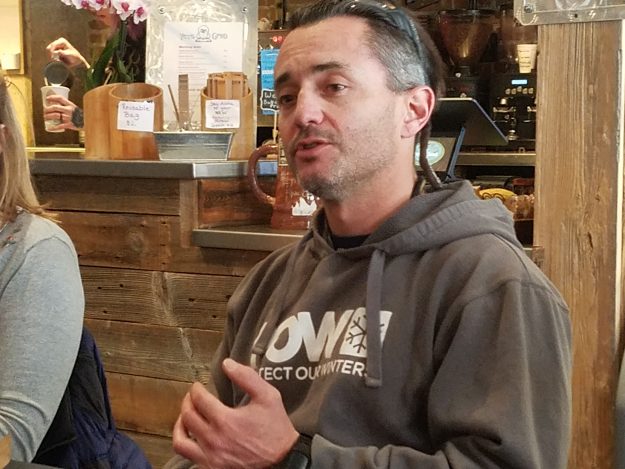Widgetized Section
Go to Admin » Appearance » Widgets » and move Gabfire Widget: Social into that MastheadOverlay zone
Protect Our Winters destroys hypocrisy of non-argument that keeps snow-sports athletes silent on climate change

So I’m that annoying sports reporter who asks athletes questions about politics and policy when seemingly everyone in the world wants sports to be an escape from those things – especially during the very divisive, highly partisan presidency of Donald Trump.

Even I admit to tuning out the problems of the planet during Sunday’s Masters, content to revel in the comeback of Tiger Woods. Why focus on the fact that he’s coming back from philandering sex addiction that cost him his first marriage and likely was quite tough on the two kids he hugged so tightly after Sunday’s 15th career major victory?
Or the fact that Woods is great pals with Trump, dining with him, playing golf with him regularly and for the most part dodging tough questions about Trump’s racist statements or vitriol aimed at immigrants? Such concerns spoil the moment and detract from our pure escapism, right?
But I always want to know where my heroes stand on critical issues of the day, so I’m that bothersome reporter who asks athletes like Bode Miller, Ted Ligety, Lindsey Vonn and Mikaela Shiffrin about climate change during the Olympics or World Cup ski races. Their answers have been thoughtful and interesting over the years, providing valuable insight into who they are.
Take, for instance, this 2010 chat with Ligety during the Vancouver Winter Games, where he was frustrated by coastal snow conditions and rain and already very active in trying to mitigate against the ravages of climate change on the snow-sports industry. He acknowledged some would find it hypocritical given that he flies around the globe ski racing.
That was nine years ago, but I recently brought it up again with Mario Molina, the executive director of Protect Our Winters – a Boulder-based nonprofit group of snow-sports athletes battling climate change (including Ligety).
Molina says that hypocrisy argument keeps athletes from getting involved because of potential blowback, but he adds it’s essentially a non-argument. Molina points out that the average American is responsible for between 22 to 24 tons of carbon a year, which is way more than the average Guatemalan living up in the mountains where Molina was born and raised. Meanwhile, the biggest polluting companies on the globe are responsible for hundreds upon hundreds of millions of tons of a carbon a year. Those are the companies that must change, he says.
“There are 15 to 25 companies that account for 85 percent of all the greenhouse gas emissions going into the atmosphere every year,” Molina said in Vail last week. “Rossignol, Jones Snowboards, Burton … are not one of those 15 to 25 companies. And so, yes, we should all live the best lifestyles that we can, we should all lead by example, but we are not the main problem.
“The main problems are the Chevrons, ExxonMobil’s, Murray Coals – all of these companies that are getting subsidized to extract, distribute and burn fossil fuels at mega scales, and we’re paying for it,” Molina added.
POW was responsible for a campaign to oust International Ski Federation President Gian Franco Kasper after he made climate change denying comments and expressed his proclivity for dictators who don’t allow environmentalists to impact policy when it comes to the Olympics.
Which leads to the natural question of why ski companies like Vail Resorts and Aspen Skiing, with long track records of trying to do the right thing on climate and conservation, continue to do business with FIS if they keep Kasper at the helm.
Why has Beaver Creek struggled so mightily the last several years to host a downhill at a time of year when snowfall is becoming increasingly uncertain – impacting normal operations for recreational skiers and frankly draining water storage at a critical time of the year? The marketing value would appear to be marginal – certainly in the United States.
And why is Aspen bending over backwards to get women’s World Cup racing back, holding a recent vote to build a hotel to pay for a new lift to satisfy FIS officials? I love ski racing and I want it to continue in the United States, but we have leverage over FIS because of our higher-elevation resorts, and we should demand change, starting at the top with Kasper.
Now here’s a re-post of a story I did on Molina and POW during the recent CampSight unconference in Vail. It ran in the Vail Daily on Tuesday:
Scientists, snow riders seek cultural shift on climate change
Mario Molina was born and raised in the mile-high mountain city of Antigua, Guatemala, but it was at much higher elevations in the Andes of Ecuador where climate change really hit home for him as he witnessed rapidly receding tropical glaciers there over a five-year span in the 2000s.
On a foot-deep powder day in the Back Bowls of Vail last week, the executive director of Protect Our Winters explained on a wind-swept ride up Chair 5 that we already have the technology and financial tools to divest from fossil fuels and invest in renewable energy. What we’re lacking, he says, is the political will and a cultural shift to combat the worst effects of climate change.
“The first thing is we needed the technical solutions that are both technology and finance,” Molina said. “The second thing is we need the political will, so we need to elect politicians and press politicians to move policies forward that will get us there. But then the third leg of the stool, without one of which the whole thing topples, is we need a cultural shift.”
Molina, who holds a Masters in Geosystems Analysis from Appalachian State in North Carolina, compares climate change to drunk driving and tobacco consumption – self-destructive practices that decades ago were far more widespread and culturally acceptable in the United States.
“Those were legislative battles that were fought and won at the policy level, but they’ve endured because they also accomplished a cultural shift,” Molina said. “Where Protect Our Winters [POW] comes in, and conferences like The CampSight come in, is mobilizing that cultural shift to a broader community.”
Dubbed “an innovation and marketing unconference for outdoor industry brands, adventurous visionaries and bold storytellers,” The CampSight just wrapped up three days in Vail last week.
Former POW board member Penn Newhard of Carbondale’s Backbone Media, during a CampSight coffee breakout at Yeti’s Grind in Vail, echoed Molina’s take on climate change and the need to quickly make that cultural shift.
“Now it’s actually in the space where people take this kind of cavalier attitude like smokers used to take, like, ‘Oh yeah, I know it’s really bad for me, but it’s probably not going to immediately kill me,” said Newhard, who founded Backbone as a PR, marketing, social media and content firm for the outdoor industry. “Climate change is a PR issue, and it’s the most dominant issue.”
But it’s also a policy issue, and Molina underscores the importance of the current Colorado legislative push to mitigate against and hopefully reverse climate change impacts – the so-called Ski Town Caucus fight in the “War on Powder” documented by the Vail Daily recently.
“It’s great to see in Colorado a lot of leadership from the House with the passing of the carbon limit bill that’s now going to the Senate,” Molina said. “As residents of Colorado, those are the kinds of initiatives that we need to get behind … That’s where we need people to show up, understand what this bill is trying to accomplish, that it doesn’t come at huge cost to consumers.”
The cultural shift with climate change will come more quickly, Molina says, when it’s equated with the loss of public lands for fossil fuel extraction and the shrinking of ski seasons, river flows and recreational opportunities. That’s why POW enlists adventure sports athletes as advocates.
Backbone’s Newhard helped professional big-mountain snowboarder Jeremy Jones found Protect Our Winters in 2007, and ski racers like Olympic gold medalist and Shred gear company founder Ted Ligety support its efforts. Other alpine greats such as six-time Olympic medalist and Bomber Ski founder Bode Miller have been equally out front on climate change.
Witnesses to waning winters
But it’s pioneering big-mountain riders like Jones, Cody Townsend and the legendary Kristen Ulmer — firsthand witnesses to the dramatic impact of climate change on first and soon-to-be last descents in Alaska’s Chugach Range and other ski-film locations — that are the most passionate.
During her recent induction into the U.S. Ski and Snowboard Hall of Fame, Ulmer told a conference room full of ski executives and snow riders in Salt Lake City she only expects the industry to last another 100 years at the current rate of warming.
Scientists agree that our snowpack is changing, endangering the Colorado River and impacting the state’s ski and outdoor recreation industry. And, even during an above-average season for snowfall in Colorado this winter, the trend of warmer, wetter storms is continuing.
Jeffrey Deems, a research scientist at the Cooperative Institute for Research in Environmental Sciences at the University of Colorado Boulder, said in a phone interview last month that the instrument record shows increased rain fraction in the snowpack, shorter snow seasons and higher snow lines during certain storms.
“When we think about the impact of climate change, it isn’t just, OK, well what does our snowpack look like in 2050, but are we now a maritime or inter-mountain climate?” Deems said. “What does that transition look like? Do we get an increased frequency of maritime-like events like this recent atmospheric river event that lands on top of a cold continental Colorado snowpack?”
Colorado experienced historic avalanches in early March after a consistent snowpack was hammered by a heavy, wet southwestern flow of moisture, but Deems says it’s “dodgy” to connect one avalanche cycle to the overall and ongoing trend of climate change.
Brian Lazar, deputy director of the Colorado Avalanche Information Center, agrees.
“Those kinds of storms are not really odd events; maybe the number of them this year and just how wet and kind of juicy they’ve been is a little bit out of the normal, for sure,” Lazar said in a March phone interview. “That’s not inconsistent with predictions of a warmer climate. That warm air can kind of just hold more moisture. Colorado is typically colder and drier.”
POW athletes, for the most part, are operating on anecdotal evidence, like Ligety pointing out the rapid deterioration of the Rettenbach Glacier at the annual World Cup stop in Soelden, Austria. But Lazar, who earned a Masters in Engineering studying snow and ice mechanics in Alaska’s Chugach Range, says Colorado snowpack is definitely being impacted by climate change.
“We’re certainly observing rain creeping earlier into the season … warmer temperatures, and that stuff is observation, so it’s a little bit more than anecdotal,” Lazar said. “We know things are getting warmer for sure, and we know kind of the frequency of rain on snow events in Colorado is going up from near zero in mid-winter to now where it’s not unheard of anymore.”
David O. Williams
Latest posts by David O. Williams (see all)
- The O. Zone: Bold Colorado sports predictions for remainder of 2024 - November 18, 2024
- Lindsey Vonn set to rejoin U.S. Ski Team - November 14, 2024
- Rail company eyeing Eagle County service no longer involved in Utah oil train proposal - November 13, 2024


